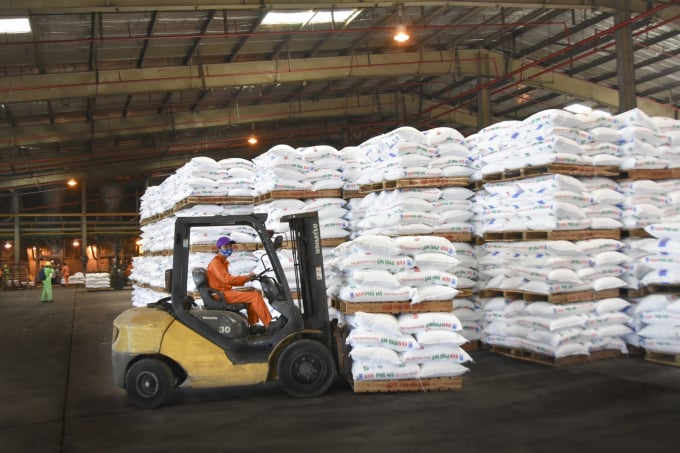November 26, 2025 | 04:21 GMT +7
November 26, 2025 | 04:21 GMT +7
Hotline: 0913.378.918
November 26, 2025 | 04:21 GMT +7
Hotline: 0913.378.918

Financial experts from the Vietnam Fertilizer Association (FAV) have issued three scenarios for the country’s fertilizer industry after the Ministry of Finance proposed value-added tax (VAT) of five per cent on fertilizer recently.
Under the proposal, the VAT rate of five per cent is suggested for fertilizer products which are now free of VAT.
Experts have said that the biggest effect of this tax adjustment is to return the fairness to domestic fertilizers with imported fertilizers, increasing the competitiveness of "Made in Vietnam" fertilizers, and encouraging Vietnamese to use Vietnamese products.
In the firsts scenario, the selling price of fertilizer products will not increase as the input VAT is not deducted. However, domestic enterprises have to reduce revenue due to the output VAT of five per cent. Thereby, their pre-tax profit may increase but not significantly.
Enterprises will be fully deducted the input VAT on new investment projects of fertilizer production without having to record an increase in asset value. This is a very good point to encourage investment, especially in new technology fertilizers, which need high investment capital.
It is estimated that all fertilizer companies will see a decrease in total revenue of more than VNĐ3 trillion, however, their pre-profit tax will not change much.
In the second scenario, the selling price of fertilizer products decreases because the enterprises reduce costs for production. This is the case in which people benefit the most.
In the last scenario, the selling price of fertilizer products will raise corresponding to the increase in output VAT. However, the selling price is decided by the market, which is currently very competitive.
Insiders have said that Vietnam has fully acceded to international treaties, in which the fertilizer import tax rate is mostly zero per cent, making the imported fertilizer prices cheap. Therefore, an increase in fertilizer prices is unlikely occurred, or if any, it will be in a very short term.
As the law is not yet amended, the imported fertilizers are seen to be a competitive advantage in comparison with the domestically-producer fertilizers because of cheap raw materials. The import tax is almost zero so the selling price is always lower than that of domestic fertilizers, making domestic production stagnant and not developed.
According to statistics of the General Department of Customs, the amount of imported fertilizers increased from 3.7 million tonnes in 2014 to more than 5.6 million tonnes in 2017, up nearly two million tonnes.
At the same time, businesses are not encouraged to invest in innovation in technology and equipment because the VAT for the investment is not refundable or deductible.
Under the direction of Standing Deputy Prime Minister Trương Hoa Binh, the law amendment will ensure the principle “not increasing input costs for farmers”, which means the fertilizer selling price after the amended law will not increase.
Experts have said that the first scenario will be the most advantageous one, in which farmers across the country will benefit in the long term, with lower fertilizer prices and reduced input costs, improving the efficiency in agricultural production and significantly increasing income for the whole agriculture sector.
Author: Nguyen Huan. Translated by To Nhu. Edited by Duc Huy.

(VAN) The Ministry of Agriculture and Environment must spearhead the construction of green governance, spanning decision-making processes and investment standards to policy evaluation mechanisms.

(VAN) The Agriculture and Environment sector of Khanh Hoa has achieved numerous milestones over the past 80 years, contributing significantly to the goal of establishing the province as a centrally governed city by 2030.

(VAN) Viet Nam is entering the pivotal period of 2025-2030, moving toward the formulation of the Remote Sensing Law, which will establish a legal foundation for the development of national digital data.

(VAN) The agricultural sector is finalizing the strategic framework for emission reduction, setting the goal of sharply cutting methane and 403.7 million tons of CO2 equivalent and moving toward Net Zero by 2050.
/2025/11/22/2236-1-153832_483.jpg)
(VAN) The National Marine Spatial Planning is opening up opportunities for sustainable blue sea development across 21 coastal localities.

(VAN) Viet Nam’s forestry sector is undergoing a comprehensive transformation, strengthening management, protection, and development efforts to maintain ecological security and drive green, sustainable growth.

(VAN) Viet Nam is accelerating efforts to digitize reservoir operations, from real-time data to hydraulic modelling.